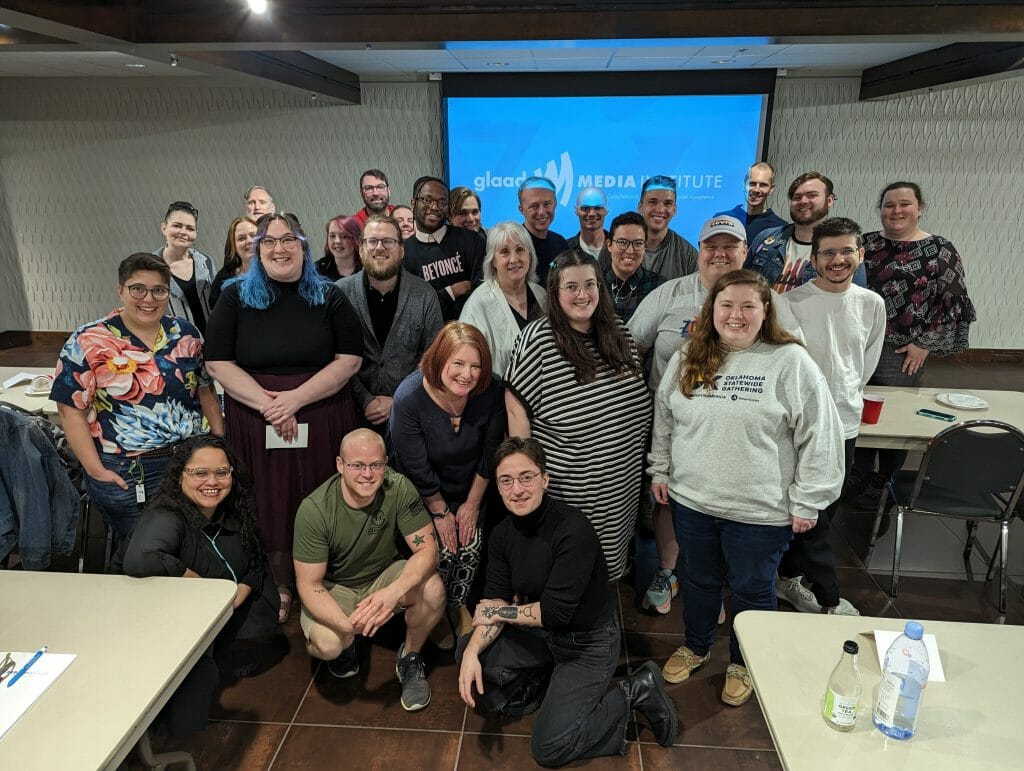On Saturday, March 25 GLAAD, the world’s largest LGBTQ media advocacy organization, visited Oklahomans for Equality’s (OkEq) Dennis R. Neill Equality Center to speak and train dozens of activists on how to speak to the media while fighting extreme anti-LGBTQ bills. Through the training titled: “Engagement 101: Telling Your Story: Messaging & Media Tools for Today’s Activist” activists learned how to share their stories to audiences who want to learn the facts about LGBTQ people to accelerate acceptance and strengthen equality throughout Tulsa and the state of Oklahoma.
Advocates expressed feeling overwhelmed in their state, but by being able to refine their messaging for Oklahoman audiences, solidarity was formed. Advocates shared groundbreaking stories about what it’s like to live in Tulsa as LGBTQ people and allies fighting for LGBTQ equality. Dorothy Ballard, the executive director of Oklahomans for Equality, hosted the event. She said that it’s been difficult to focus on messaging as a movement, especially as one of the sole point people of OkEq.
“I have to interact with people seeking information all the time. Just in the limited amount of work that we’ve been able to do together, I’ve been able to refine and hone my messaging,” said Ballard. “What was most moving to me is seeing the light bulb moments across people in attendance today, and then going ‘Aha I can do this!’ The other takeaway is that Oklahoma is so often regulated to a fly over state zone. And because of that, there is a lot that’s overlooked or neglected here.
Ross Murray, the Vice President of the GLAAD Media Institute, and the GLAAD Media Institute associate, Lana Leonard, have been speaking with advocates on the ground for months before their visit. Advocates have said that because Oklahoma is a solid red state, there is less focus on their struggles. With focuses heavy on Florida and Texas, as an example, Oklahomans said they need hope to look at a tangibly safe future for LGBTQ people. For some, this training was a start. Leonard, who facilitated the training, spoke to a number of advocates about their work towards LGBTQ equality in Tulsa, and how this training will shape their advocacy.
“I have a plan to take what we learned and focus on the ways that we can be more calculated and proactive in contacting local media. We have some relationships with some outlets, but not, I don’t think, strong enough. I really want to build those,” said Fernande Galindo, Community Organizer for Tulsa Intersectional Queer Network.
For Galindo this isn’t the be all and end all, but one lane for advocacy to tighten. Like many of the advocates in the room they were overwhelmed with the merciless anti-LGBTQ legislation passing in Tulsa.
Just last Tuesday, March 21, Oklahoma state representatives passed HB 2546, otherwise known as the Don’t Say Gay or Trans law, just an hour after debriefing, according to local ABC affiliate KTUL. The bill works to censor history, health education, and all discussions of sexual orientation, gender identity, gender expression and race in the classroom. This comes as more than 40 anti-LGBTQ bills advance in the state legislature. In addition, just a couple weeks after the city of Tulsa passed a resolution designating the city “a safe, inclusive, and welcoming community and reaffirming the City of Tulsa’s commitment to fostering a safe, inclusive, and welcoming City.”
Ballard described the Oklahoman legislature inverse to what many states experience.
She recalled a Trevor Project statistic she heard at the Creating Change Conference in San Francisco “that was like 90% of this garbage that goes through legislatures doesn’t get passed.” But for Oklahoma, Ballard says, the opposite is true. “These bills pass 90% of the time for us,” she said.
For others, the training informs how they show up for LGBTQ people in their day jobs and careers.

Theron Ogedengbe, a social Worker and therapist at Anchored Behavioral Health, said that the training will help him speak to not only his communities but to lawmakers.
“I’m a behavioral health therapist, but I’m also an advocate for foster youth and just an advocate in general, so these worlds intersect. You have to have a level of activism to be a great mental health person or professional because you’re gonna have to step back for your clients, your patients and yourself.”
“And with learning how to speak to the media, one: I can get my message across thoroughly, fully and intellectually without having to use what-about-isms or illogical fallacies to get my possible point across,” said Ogedengbe.
The advocate said he hopes that audience members who’re feeling pain can turn that feeling into “power”.
Advocates like Lucas Hall who works for the Tulsa Prism Project shares a little about his experience as a trans man who’s been kicked out of his Christian College. “I’ve lost family, I’ve lost friends, I’ve lost jobs, all for being trans,” said Hall. “…it has definitely tried to keep me down, and a few times it has, but thankfully I found some resilience.”
Today, Hall builds LGBTQ inclusion through education, outreach and building relationships through his Christian faith.
In the nearer future, advocates are preparing for a trans medical care ban, if not in this legislative session than the next. For these advocates, this legislative session is only the beginning.













